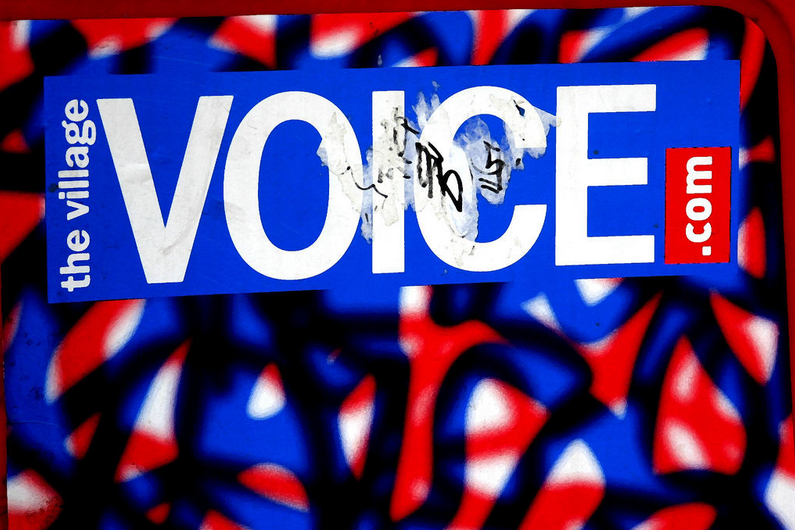
It was already a dark, disheartening year to work in journalism—industry-wide layoffs, "pivots to video," near-daily attacks from President Trump. Then the Village Voice announced that it's shuttering its beloved print publication after 62 years.
The publication will carry on in digital form, but the recognizable alt-weekly paper format—distributed free since 1996 from those immediately identifiable red-and-blue distribution boxes—will soon be history.
For New Yorkers with even the slightest inclination toward the counterculture, it is the end of an era. For the brilliant writers and editors who worked there, though, it's something more personal: The Village Voice has been a home for writerly eccentrics and misfits, a boot camp, a cultural epicenter, an institution. As longtime Voice staff writer Greg Tate says, writing for the alt-weekly made music writers feel like they were rock stars too.
You could write a history of the Voice just from the names associated with it and the careers it helped launch, from music critics like Robert Christgau and Jessica Hopper to the investigative reporter Wayne Barrett and the legendary nightlife chronicler Michael Musto.
We reached out to some Voice alumni and asked them what they learned during their tenures—and what the paper meant to them. (We also asked a few present Newsweek staffers who had brief but formative experiences writing for the paper.)
All of these comments and reminiscences were provided to Newsweek via email, except for the one by novelist Colson Whitehead, which is just a tweet.
J. Hoberman, staff writer, then senior film critic (on staff: 1983 to 2012)
"The Village Voice was my education—as a kid growing up in Queens in the 1960s (appreciating New York City), as a future film critic (reading Jonas Mekas and Andrew Sarris) and, starting in the 1970s, as a writer. I cannot overstate the degree of freedom I enjoyed there or praise too highly the brilliant minds I encountered. I could not have become myself without it."
Maura Johnston, music editor (on staff: 2011 to 2012)
"I loved the Voice growing up, and am proud of the work I did there and happy that I published so many amazing writers. I hope that the curiosity and the intrepid spirit that the Voice and papers like it fostered finds a place to flourish online, although it'll take a lot of bucking against traffic pressures and cultural myopia."
Edmund Lee, contributing editor (on staff: 1994 to 1999)
"The Voice was a newsroom full of strong personalities, really smart men and women with deep opinions on everything—that's what made it so great. It also resulted in a lot of arguments. We had a file in the shared computer system called 'Tantrums' that documented every major fight in the newsroom—the bigger fit you threw, the more points you got, and you lost points if you apologized. It was kind of the childish artifact, but it picked at one of the kernel truths about the Voice: If you didn't know how to speak up or fight for things, you would never have gotten anywhere, so the main thing I learned was how to push, how to stand up for yourself, how to just be relentless. That's really what it means to be a journalist.
Related: "Village Voice" staffers walk out for better pay and better coffee
"It's also the place I learned the craft altogether, and that just comes from watching. From listening to guys like Wayne Barrett on the telephone, or talking with Jim Ledbetter, or hanging out in the smoking room with Colson Whitehead. I couldn't have gotten a better education."
Kenneth Li, intern (on staff: 1995)
"I interned there. I learned that hanging out in the smoking room was a great way to pitch stories."
Anna Merlan, staff writer (on staff: 2013 to 2014)
"Writing for the Voice was a boot camp in feature writing. During my time in the Voice system, I wrote 10 magazine-length features a year, which means turning out big stories really fast and making them readable and fun and lively. I never would've gotten the chance to do that as a young writer anywhere else. The Voice will always be viewed as a jumping-off point for lots of great writers. I wish I trusted that their management would be smart enough to give their current staff what they need, including a fair union contract."
Michael Musto, longtime gossip columnist (on staff: 1984 to 2013)
"Karen Durbin, who edited my La Dolce Musto column when I started it in 1984, urged me to dive into my work, explore a bevy of possibilities and run free with it in order to find my voice. She said, 'You have to go too far to know how far to go.' Having freelanced for more conventional publications, I was used to writing things to order and fitting them into a publication's format. The Voice was a writer's paper, with each person given the freedom to put their own personal stamp on their work. I found that liberating, cathartic and extremely gratifying, though since then, I've found it very hard to go back to conventional writing for hire."
Alexander Nazaryan, writer who got his first bylines in the Voice (contributing: 2007 to 2008)
"I remember when the Village Voice was as thick as a phonebook, but much more fun to read. In the days before the internet, it was like a message board for all the weirdos and brainiacs in New York. I got my first significant byline there, a 150-word review of an anthology of LGBTQ cyberpunk fiction. I remember the thrill precisely, the conviction that I was on my way. I learned from the Village Voice about New York, about the complexity of the city's cultural life and how not to write like a pretentious snob."
Greg Tate, staff writer (on staff: 1987 to 2005)
"Recently explained to a radio interviewer that scribing for the Village Voice—let alone making the cover—in the '80s and '90s made all us cocky-ass young music writers feel like we were rock stars or star-rappers too. At least through the weekend. We brought the daredevil prose, shot wildly from the hip, but that print edition brought The Drama, with a dramatic scale that matched Broadway far as we were concerned."
Colson Whitehead, writer/critic (on staff: 1991 to late 1990s)
'50s, '70s, '90s...No matter when you worked at the Voice, that's when it was at its peak, and when you left it went downhill.
— colson whitehead (@colsonwhitehead) August 22, 2017
Elizabeth Zimmer, senior editor (on staff: 1992 to 2006, 2015 to present)
"Rigorously edited and fact-checked, the Voice was nevertheless a writer's paper; you could say what you thought the way you wanted to say it. When I began writing about dance there in 1983, it was considered the shop paper of the downtown arts community. I was hired as a senior editor in 1992, let go by new owners in 2006 and re-recruited two years ago by even newer owners. I'm looking forward to seeing what [owner Peter] Barbey and his crew make of an all-online Village Voice."
Uncommon Knowledge
Newsweek is committed to challenging conventional wisdom and finding connections in the search for common ground.
Newsweek is committed to challenging conventional wisdom and finding connections in the search for common ground.
About the writer
Zach Schonfeld is a senior writer for Newsweek, where he covers culture for the print magazine. Previously, he was an ... Read more
To read how Newsweek uses AI as a newsroom tool, Click here.








